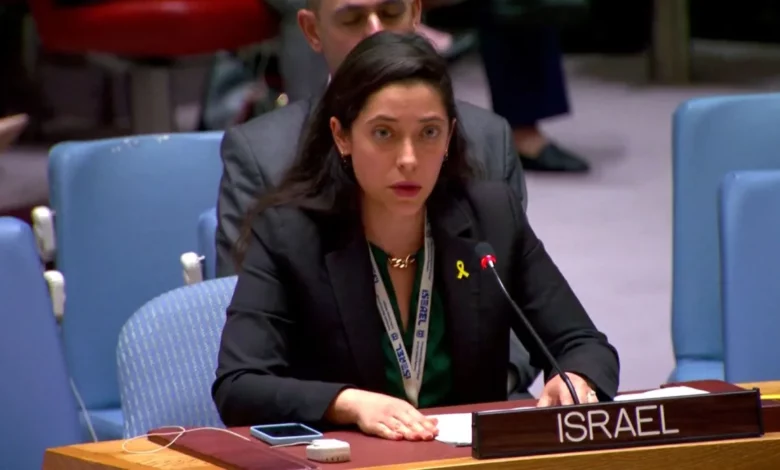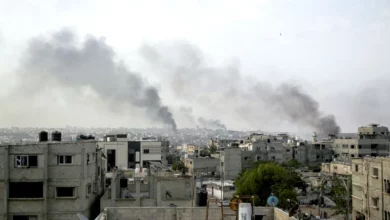
Israel on Monday vowed to persist with its military operation in Gaza, saying it won’t engage in “meaningless” negotiations with Hamas, shortly after the United Nations Security Council overwhelmingly approved a US-drafted ceasefire plan intended to bring an end to the eight-month war.
Israel’s representative to the UN, senior diplomat Reut Shapir Ben-Naftaly, emphasized at a UNSC meeting that her country wants to “ensure that Gaza doesn’t pose a threat to Israel in the future.”
She said the war would not end until all hostages were returned and Hamas’ capabilities were “dismantled,” accusing the Palestinian militant group of using “endless negotiations … as a means to stall for time.”
Her comments came after 14 of the 15 UNSC council members voted in favor of Monday’s US-drafted resolution, with only Russia abstaining – the first time the council has endorsed such a plan to end the war. Israel is not a member of the UNSC, and so did not vote.
The comprehensive three-stage peace deal, which sets out conditions intended to lead to the eventual release of all remaining hostages, in return for a permanent ceasefire and withdrawal of Israeli forces, was first laid out by US President Joe Biden on May 31.
The landmark vote means the UNSC now joins other major global bodies in backing the US-drafted plan, increasing international pressure on both Hamas and Israel to end the conflict.
Israel and Hamas react
Hamas welcomed the adoption of the resolution, saying in a statement it was ready to engage with mediators to implement measures such as the withdrawal of Israeli forces from Gaza, prisoner exchange, returning residents to their homes and the “rejection of any demographic change or reduction in the area of the Gaza Strip.”
The resolution says Israel has accepted the plan, and US officials have repeatedly emphasized Israel had agreed to the proposal – despite public comments from Israeli Prime Minister Benjamin Netanyahu that suggest otherwise.
Even last month, less than an hour after Biden unveiled his proposal, Netanyahu insisted Israel would not end the war until Hamas is defeated.
The United States ambassador to the UN, Linda Thomas-Greenfield, said on Monday the US would guarantee Israel follows through with its obligations, while Egypt and Qatar would do the same with Hamas.
“The fighting could stop today,” if Hamas agreed to the deal, she said.
But detailed negotiations to implement its provisions are yet to yield agreement from both Israel and Hamas.
The deal is divided into three phases, according to Thomas-Greenfield. It includes an initial ceasefire, the release of Israeli hostages and the exchange of Palestinian prisoners, and ultimately a permanent end to hostilities and full withdrawal of Israeli forces from Gaza, the effective distribution of aid and a major multiyear reconstruction in the strip.
The ambassador also said the deal “rejects any geographical changes” in Gaza and reiterates the commitment for a two-state solution.
The Palestinian UN envoy Riyad Mansour said the Palestinian Authority – which governs the Israeli-occupied West Bank – welcomed the deal as a “step in the right direction,” but said it was up to Israel to implement those measures.
“We want a ceasefire,” he said, adding the “burden is on the Israeli side to implement this resolution.”
“The proof is in the pudding. We will see who are the ones who are interested to see this resolution to become a reality and those who are obstructing it and want to continue the war of genocide against our people,” he added.
US pushes for Israeli support on deal
Ahead of the vote, US Secretary of State Antony Blinken told Netanyahu during a meeting in Jerusalem the proposal would “unlock the possibility of calm along Israel’s northern border and further integration with countries in the region,” according to a State Department readout.
After the resolution was adopted, Blinken spoke with Israeli Defense Minister Yoav Gallant, where he “commended Israel’s readiness to conclude a deal and affirmed that the onus is on Hamas to accept,” according to a readout of their meeting.
Blinken arrived in Israel on Monday, following the resignation of Benny Gantz from the Israeli war cabinet on Sunday. Gantz’s departure delivered a blow to Netanyahu, who is coming under increasing pressure from Western allies and families of hostages to end the war and bring back the captives.
Eight months since the war began, Israel is yet to achieve its stated objectives as most of Hamas’ top leadership remains at large, while earlier this week, Israeli military officials estimated around 120 hostages remain captive, of which around 70 are thought to still be alive.
More than 37,000 people have been killed in Gaza since the war began, according to the Ministry of Health in Gaza.
CNN cannot verify the numbers provided by the ministry, which does not distinguish between casualties among fighters and civilians. It does not include in its figures the several thousand people thought to be missing, or those still under the rubble in Gaza since October 7.




